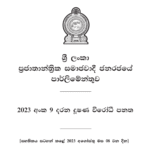Case Details:
Case Title: China Harbour Engineering Company (Lanka) Limited v. Commissioner General of Labour & Others
Case No.: C.A. (WRIT) 464/2021
Court: Court of Appeal of Sri Lanka
Judges: Sobhitha Rajakaruna, J. & Dhammika Ganepola, J.
Counsel: Malik Hannan for the Petitioner; Navodi de Zoysa, SC for 1st & 2nd Respondents
Decision Date: 19.01.2024
Background
The Petitioner, China Harbour Engineering Company (Lanka) Limited, sought a Writ of Certiorari to quash the order dated 19.07.2021 issued by the 1st Respondent, the Commissioner General of Labour. The dispute arose when the 3rd to 7th Respondents, former employees of the Petitioner, alleged wrongful termination of employment and lodged complaints under the Termination of Employment of Workmen (Special Provisions) Act No. 45 of 1971 (TEWA).
Facts of the Case
- The 3rd Respondent was allegedly involved in misconduct on 10.09.2018, with the 4th to 7th Respondents subsequently abetting the misconduct.
- The Petitioner claimed that it intended to initiate disciplinary proceedings but had not commenced any before the Respondents filed complaints.
- The 1st Respondent assigned the 2nd Respondent to hold an inquiry, which concluded on 19.07.2021, awarding the 3rd to 7th Respondents compensation of Rs. 969,540.00.
- The Petitioner contended that the 1st Respondent’s decision was contrary to TEWA, arguing that there was no formal termination of employment.
- The Petitioner asserted that TEWA did not apply to terminations based on disciplinary grounds.
Legal Issues
- Was there a wrongful termination of employment under TEWA?
- The 3rd to 7th Respondents claimed they were constructively dismissed when prevented from reporting to work.
- The Petitioner denied terminating their employment but failed to present evidence of an ongoing disciplinary process.
- Did the 1st Respondent act within jurisdiction under TEWA?
- TEWA applies to cases where termination occurs without prior written consent or the Commissioner General of Labour’s approval.
- The Court found that there was no evidence of disciplinary action, making TEWA applicable.
- Could the Petitioner Company have requested a disciplinary inquiry earlier?
- The Court noted that the Petitioner only raised this argument later in the inquiry and did not take steps to hold a disciplinary inquiry before preventing the employees from working.
- Should the complaints have been referred to the Labour Tribunal instead?
- The Court held that the 3rd to 7th Respondents had met the necessary statutory requirements under TEWA, making their complaints valid before the Commissioner General of Labour.
Court’s Findings & Ruling
- The Court held that the constructive termination of the 3rd to 7th Respondents fell within TEWA’s scope, rejecting the Petitioner’s argument that disciplinary terminations were excluded.
- Since no evidence supported the claim that a disciplinary inquiry was pending, the Petitioner’s assertion of a future disciplinary process was deemed unsubstantiated.
- The Petitioner failed to demonstrate that the 1st and 2nd Respondents acted ultra vires or contrary to statutory provisions.
- The Court dismissed the application, affirming the award of compensation to the 3rd to 7th Respondents.
Conclusion & Implications
This case underscores the importance of adhering to due process in employment terminations. Employers must ensure:
- Proper documentation of disciplinary actions before restricting employees from working.
- Compliance with TEWA’s procedural requirements, especially in disputes over wrongful termination.
- Timely initiation of disciplinary proceedings, rather than raising such claims only during legal proceedings.
The Court’s ruling reinforces employee protections under TEWA, emphasizing that even constructive terminations must align with statutory safeguards. Employers failing to follow due process may face legal repercussions, including compensation claims and adverse judicial findings.
Download Judgement














